SUMMARY
The Howard G. Buffett Foundation (HGBF) grant is strengthening and extending N2Africa activities in South and North Kivu Provinces of the East of DR Congo. The targeted provinces face persistent food insecurity due to poor or inadequate crop production systems, despite agriculture being a major activity of the population. Interestingly, both partner NGOs and small-scale subsistence farmers involved in N2Africa – HGBF in DR Congo expressed satisfaction, and projected a strong potential to move the agricultural sector from "Despair" to "Hope".
N2AFRICA – HGBF in DR CONGO
The Ruzizi plain of South Kivu and Rutshuru/Masisi areas of North Kivu DR Congo are major agricultural zones with extensive agricultural land and human capital to enable sustainable agricultural development. Farmers often use poorly yielding plant varieties, with major crops such as cassava, maize, sorghum, beans, etc. The introduction of legume-based, mixed cropping systems (i.e. main crops intercropped with soyabeans or bush beans) has a great potential to enhance crop production, both through the additional legume grain and through enhanced soil fertility through atmospheric N2-fixation into the soil. Benefits in enhancing production were achieved through agronomic activities (i.e. demonstration trials) and dissemination activities (i.e. distribution of high yield crop seedlings to farmers via partner NGOs).
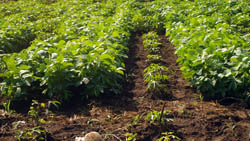 |
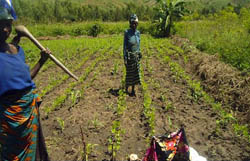 |
Left: Cassava and soyabean intercropping Right: Demonstration trials for maize and soyabean intercropping
|
PARTNERSHIPS
We engaged in partnership with local NGOs to facilitate hands-on training of small-scale subsistence farmers and dissemination of the alternative mixed cropping systems, One of the strategic partners is Women for Women (W4W) International W4W that is operational in both South and North Kivu Provinces, and focuses activities on women, particularly those from post-conflict areas. The NGOs group the farmers into different action sites, ensure demonstration and training for setting up trials, data collection, monitoring and evaluation.
Early results
Enhanced crop production/productivity improves the income of subsistence farmers, particularly female farmers who are mostly involved in subsistence agriculture. Thereby, mitigating gender inequality by bridging the income gap between men and women, as well as improving their livelihood.
APPRAISAL OF N2AFRICA – HGBF IN DR CONGO
The partner institutions and small-scale subsistence farmers are positive about the extension of N2Africa activities in the Ruzizi plain of South Kivu Province DR Congo through the HGBF grant. As a result, the number of farmers involved in the dissemination campaign for the upcoming farming season has doubled from 500 households per partner NGO to 1000 households each. Partners and farmers are excited about the cropping systems and rhizobium inoculation, and they pledged to use the innovative rhizobium technology in subsequent farming seasons. In addition, the introduction of soyabean in the Ruzizi area is much acclaimed as an important innovation in their cropping systems.
|
Left: Soyabean demonstration trial Right: IITA & CDC inspect soyabean seeds multiplied by CDC for dissemination
|
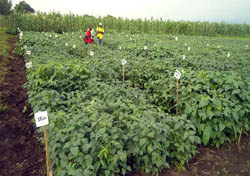 |
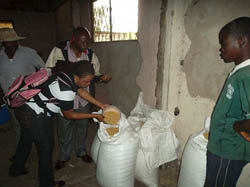 |
N2AFRICA OUTLOOK
The availability of rhizobium inoculum – possibility of producing local inoculum.
Partners and farmers are expecting more training to consolidate the gains made in light of the N2Africa project and to expand the technology to other farmers.
Partner institutions are anticipating creating a farmers’ cooperative group for soyabeans farmers, facilitate postharvest technology, price stabilization and the marketing of produce.
Women for Women are very interested in the innovative N2Africa rhizobium technology and wish to continue with dissemination after the passage of N2Africa project. Hence, they wish to have their staff (engineers and facilitators) trained by IITA on the mixed-cropping system and rhizobium technology.
Postharvest technology development for produce is anticipated, i.e. soyabeans (CDC already has an abandoned facility for processing grains, and as a result of the positive impact of N2Africa, CDC is considering alternative sources of funding to rehabilitate the facility for oil production from soyabeans. CDC is hopeful that the postharvest transformation will ensure sustainability of the innovative legume-rhizobium based cropping systems and pull subsistence farmers out of their current state of "Despair to Hope".
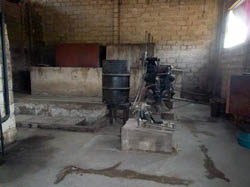 |
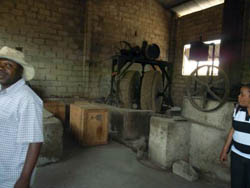 |
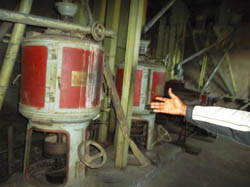 |
CDC presents abandoned facility to be to rehabilated for processing of soyabeans
Christopher Ngosong1; Despines Bamuleke1; Rehani Jumaine2: IITA–HGBF DR Congo IITA – HGBF, 1Bukavu South Kivu and 2Goma North Kivu, DR Congo.
Correspondence: ngosongk@yahoo.com
